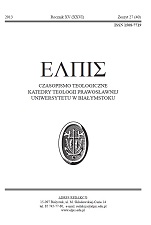Święci Cyryl i Metody w świetle filiokwistycznej idei Karola Wielkiego
St. Cyril and Methodius in the light of the filioquistic idea of Charlemagne
Author(s): Warsonofiusz DoroszkiewiczSubject(s): Christian Theology and Religion
Published by: Wydawnictwo Uniwersytetu w Białymstoku
Keywords: St. Cyril and Methodius; Roman Empire; Charlemagne; Church; Byzantium; filioque; Holy Spirit
Summary/Abstract: During twelve years St. Methodius build up Slavonic Church in Central Europe. His position was a singulary difficult one. He had to contend with problems caused by Franks. The Frankish clergy did everything possible to undermine his authority: their resentment of his archiepiscopal powers and their dogged opposition to the Slavonic liturgy now combined with a theological grievance, which they loudly voiced both in Moravia and in Rome. The Frankish Church now firmly committed to the doctrine of the filioque. It had already arisen in 867, when patriarch Photius denounced the Franks for spreading filioque in Bulgaria. Now in Moravia, between 879 and 885, filioque flared up afresh, embittering the last years of Methodius’ life. The Church of Rome, though it did not formally accept filioque until the early eleventh century, had already begun to adopt it unofficially. The Byzantine Church strongly objected to the filioque, partly on the grounds that any alternation to the Creed had been expressly forbidden by the ecumenical councils, and partly because it believed to be theologically erroneous. Methodius, who, despite his position as papal legate, remained a Byzantine in outlook, could not fail to regard this doctrine, accepted by Frankish subordinate clergy as heretical. The filioque was to become the basic theological issue in the medieval controversies between the Byzantine and Roman Churches.
Journal: Elpis
- Issue Year: 2013
- Issue No: 15
- Page Range: 43-48
- Page Count: 6
- Language: Polish

